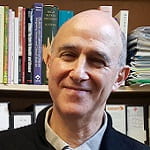by Gene Feder, GP and Professor of Primary Care, Centre for Academic Primary Care, University of Bristol
The Plague, a novel by Albert Camus, published in 1947, tells the story of Oran, a city struck by bubonic plague. It was an extended metaphor for living under fascism and the way society and individuals behave under occupation.
I found an English translation at the back of a book shelf, having first read it as a teenager over half a century ago. On the title page there is a stamp: ‘Rainbow Library Salzburg THIS BOOK IS A [sic] PROPERTY OF THE UNITED STATES’. My father – working with Holocaust* survivors in Germany and Austria – must have forgotten to return it.
In 2020, it turns out that the book – partially – exemplifies our response to the pandemic du jour: COVID-19.
Everybody knows that pestilences have a way of recurring in the world; yet somehow we find it hard to believe in ones that crash down our heads from a blue sky. There have been as many plagues as wars in history; yet always plagues and wars take people equally by surprise.
Narrated by (spoiler alert) Rieux, a doctor, hiding his identity until the end of the book, it describes the rapid descent into plague – albeit just in one place – life and death in a quarantined city, and the painfully slow fizzling out of the epidemic after many months.
The initial slow response of the city council, despite Rieux’s prompting, based on seeing several of his patients with tell-tale bubonic plague symptoms and signs, echoes the slow global reaction to COVID-19, including the UK:
… Rieux observed that small official notices had been just put up about the town, though in places where they would not attract too much attention. The measures were far from draconian and one had the feeling that many concessions had been made not to alarm the public
In the story, anti-bubonic plague serum, the pre-antibiotic era treatment, is ‘[E]nough for immediate requirements, but not enough if the epidemic was to spread …‘, which it does, when quarantine and isolation of symptomatic patients comes too late to change its course.
Although COVID-19 has no curative treatment, our parallel is the shortage of personal protective equipment and ventilators, that threatens the lives of clinicians and patients respectively.
The shift from life as normal to the epidemic becoming everyone’s preoccupation was relentless in Oran, as it has been in the UK –
However, toward the end of the month…there were more serious developments, altering the whole aspect of the town…petrol was rationed and restrictions were placed on the sale of food…the traffic thinned out progressively…luxury shops closed overnight…
– with a strange expansion of time, daily frustration, and dimming of the future, which in our pandemic is exacerbated by necessary social distancing/isolation policies.
Hostile to the past, impatient of the present, and cheated of the future, we were much like those whom men’s justice, or hatred, forces to live behind prison bars
Thus each of us had to be content to live only for the day, alone under the vast indifference of the sky. This sense of being abandoned, which might in time have given characters a finer temper, began, however by sapping them to the point of futility
So, what of the doctor’s response? As a GP in Bristol, although not yet on the front line of the pandemic like my hospital colleagues, I identify with this:
Throughout the day the doctor was conscious that the slightly dazed feeling that came over him, whenever he thought about the plague, was growing more pronounced. Finally he realised that he was afraid!
My fear comes in waves, sometimes at 3.00am, remembering recent conversations with doctor friends in Milan and thinking about our PPE shortage. It recedes with academic and clinical work, being with my immediate family and (remote) contact with my wider family, friends and colleagues.
The strength of friendship and solidarity is near the heart of what is hopeful in The Plague, although it does not disguise the impact of isolation and apathy as the months and deaths mount up.
Plague , like abstraction, was monotonous … all he was conscious of was a bleak indifference …
Near the beginning of the book, in the first signs of the epidemic to come, Rieux, after contemplating the worst case scenario (which comes to pass):
… opened the window, at once the noises of the town grew louder. The brief, intermittent sibilance of a machine-saw came from a near-by workshop. Rieux pulled himself together. There lay certitude; there in the daily round. All the rest hung on mere threads and trivial contingencies … [T]he thing was to do your job as it should be done.
That is what I, and every doctor, nurse and other frontline colleague I know, aspire to achieve over the months ahead.
*long before the term was applied to the genocide of World War II


Hi Gene,
Thank you for this piece. If I can get hold of a copy of the book, you have inspired me to read it – it will have to be a translation!
Being on my own the joy of the daily walk with the dogs goes someway to relieving that sense of apathy that Rieux feels. Hearing the birds, watching the leaf buds unfurl and the greening of spring on the Downs keeps me feeling hopeful.
Keep safe and well,
Sue